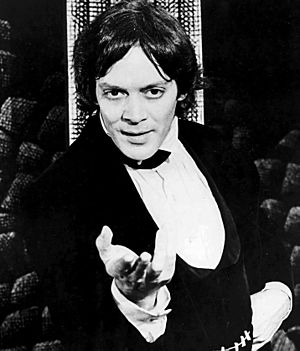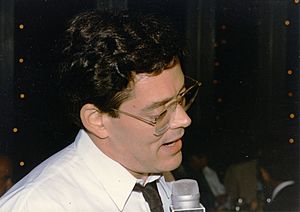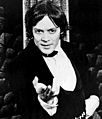Raul Julia facts for kids
Quick facts for kids
Raúl Juliá
|
|
|---|---|

Juliá as Dracula (1977)
|
|
| Born |
Raúl Rafael Juliá y Arcelay
March 9, 1940 Floral Park, San Juan, Puerto Rico
|
| Died | October 24, 1994 (aged 54) Manhasset, New York, U.S.
|
| Resting place | Buxeda Cemetery, Cupey, San Juan, Puerto Rico |
| Education |
|
| Occupation |
|
| Years active | 1950s–1994 |
| Spouse(s) |
Magda Vasallo Molinelli
(m. 1965; div. 1969)Merel Poloway
(m. 1976) |
| Children | 2 |
| Signature | |
 |
|
Raúl Rafael Carlos Juliá y Arcelay (born March 9, 1940 – died October 24, 1994) was a famous actor from Puerto Rico. He was born in San Juan. Raúl loved acting from a young age and decided to make it his career after finishing school.
After acting in Puerto Rico for a while, another actor named Orson Bean encouraged him to move to New York City. Raúl was able to speak two languages since he was a child. He quickly became interested in plays on Broadway and Off-Broadway. He even took over a role in a popular musical called Your Own Thing. He also performed in shows that traveled around, like the Puerto Rican Traveling Theater.
A producer named Joseph Papp noticed Raúl and offered him work with the New York Shakespeare Festival. This helped him become more well-known. He then got roles in TV shows like Love of Life and Sesame Street. In 1978, he acted with Meryl Streep in a play by William Shakespeare called The Taming of the Shrew. He was nominated for a Tony Award and won a Drama Desk Award for his role in Two Gentlemen of Verona. He was nominated for Tony Awards four times between 1974 and 1982.
Raúl Juliá also starred in many movies. His first film was in 1971 with Al Pacino in The Panic in Needle Park. In the 1980s, he was nominated for two Golden Globe Awards for his roles in Tempest and Kiss of the Spider Woman. He won an award for Best Actor for Kiss of the Spider Woman. He also appeared in films by famous directors like Francis Ford Coppola and Clint Eastwood.
In the early 1990s, Raúl Juliá became very famous for playing Gomez Addams in two The Addams Family movies. In 1994, he filmed The Burning Season and a movie based on the Street Fighter video games. Sadly, he faced serious health problems that year and passed away after a stroke. His funeral was held in Puerto Rico, and thousands of people attended. For his work in The Burning Season, Raúl won several awards after his death, including a Golden Globe, an Primetime Emmy Award, and a Screen Actors Guild Award.
In 2017, The Daily Telegraph newspaper said he was one of the best actors who never got an Academy Award nomination.
Contents
Raúl Juliá's Early Life and Education
Raúl Juliá was born on March 9, 1940, in Floral Park, a part of San Juan. His parents were Olga Arcelay and Raúl Juliá. He was the oldest of four children. His mother was a singer in a church choir. His father was an electrical engineer.
Raúl's brother, Rafa, died in a car accident when Raúl was 19. Some of his relatives were also musicians, and his great aunt María González inspired him to become an artist. His family was Catholic and often welcomed homeless children into their home.
Raúl's father started a restaurant in San Juan called La Cueva del Chicken Inn. It was one of the first places in Puerto Rico to serve pizza and chicken-in-a-basket!
Raúl went to a Catholic private school where most people spoke English. In first grade, he acted in his first play, playing the devil. After that, he was in all the school plays. When he saw Errol Flynn in the movie The Adventures of Robin Hood, he decided he wanted to be an actor.
By seventh grade, Raúl spoke English very well. He became interested in William Shakespeare's plays. He finished high school at Colegio San Ignacio de Loyola. There, he helped put on plays like Julius Caesar and Hamlet. To make his parents happy, he studied for a year at Fordham University in New York City. Then he returned home to the University of Puerto Rico, where he earned a Bachelor of Arts degree.
Even while studying, Raúl kept acting in local plays and nightclubs. He soon realized he didn't want to be a lawyer, which his parents hoped for. He chose to act full-time, even though he wasn't sure if he could make a living from it.
Raúl Juliá's Acting Journey
Starting in New York City
Raúl Juliá began acting in many plays in San Juan. He performed in a play called Macbeth in a colonial castle to make it feel more real. He also played Roderigo in Othello. He even appeared on a TV show called Ted Mack Amateur Hour.
One day, actor Orson Bean met Raúl in Puerto Rico. Orson told him to come to New York to work. Raúl's parents were surprised but supported his choice. His move was delayed when his younger brother, Rafael, died in a car accident. During this time, Raúl got engaged to Magda Vasallo Molinelli.
In 1964, when he was 24, Raúl moved to New York. He worked many different jobs to pay his bills. When his friend Lillian Hurst visited, they saw a Broadway play. This made Raúl realize he could be a full-time actor. He started looking for roles in Broadway and Off-Broadway plays. He also took acting classes from Wynn Handman. His classmate was another future star, Christopher Walken.
His first role in New York was in a play called Life Is a Dream. This helped him get his Actors Equity card, which actors need to work professionally. At first, his parents sent him money, but after he got a role in Bye Bye Birdie, he didn't need their help anymore. He also performed with a traveling theater group that put on plays in poorer neighborhoods. In 1965, he married Magda Vasallo Molinelli.
In 1966, Raúl played Macduff in a Spanish version of Macbeth. He also acted in The Ox Cart. Miriam Colón Valle, who was also in La Carreta, started the Puerto Rican Traveling Theater, where Raúl performed. In 1967, Joseph Papp, who started the New York Shakespeare Festival (NYSF), saw Raúl performing poetry. Papp offered him a role in a play called Titus Andronicus. After that, Papp hired him as a stage manager for Hamlet, and Raúl also acted in some of the plays.
Broadway and Television Roles
In September 1968, Raúl Juliá made his Broadway debut in The Cuban Thing. The next year, he was in a play called Indians. Around this time, he and Magda Vasallo Molinelli divorced. In 1970, Raúl received great reviews for his role in The Castro Complex. While rehearsing for another play, he met Merel Poloway, and they started a relationship.
As he became more famous on Broadway, Raúl got roles in two TV shows: Love of Life and Sesame Street. He didn't like Love of Life and only stayed for a short time. On Sesame Street, he played Rafael the Fix-It Man, a character who appeared often during the show's third season. In 1971 and 1972, he also acted in three movies.
While working on Sesame Street, Joseph Papp offered Raúl the role of Proteus in Two Gentlemen of Verona. For this role, Raúl received his first Tony Award nomination and won the 1972 Drama Desk Award. In 1973, he played Edmund in King Lear and Orlando in As You Like It. Raúl loved playing these Shakespeare roles because of their rhythm, music, and poetry.
In 1974, Raúl was nominated for his second Tony Award for playing Charley Wykeham in Where's Charley?. In 1976, he played Mack the Knife in The Threepenny Opera, using a strong British accent. This performance earned him a third Tony Award nomination. He then returned to movies in The Gumball Rally.
That same year, Raúl married Merel Poloway. The ceremony was part of a spiritual retreat. Raúl joined The Hunger Project, an organization that works to end world hunger. He set a goal to raise one million dollars for the group. In 1978, his role as Dracula in a play was very popular.
While playing Dracula, Raúl also played Petruchio in The Taming of the Shrew with Meryl Streep. He then spent several months in Italy filming The Tempest. He also got his fourth Tony Award nomination for the play Nine. To prepare for a play called Betrayal, Raúl moved to London and hired a coach to help him with his British accent. He used this accent in many of his later films.
Becoming a Hollywood Star
In 1982, Raúl Juliá played Calibanos in Tempest and Ray in the musical One from the Heart. In 1983, his first son, Raúl Sigmund Juliá, was born. He also starred in a TV film called Overdrawn at the Memory Bank.
After two years without a film role, Raúl played a political prisoner named Valentín in Kiss of the Spider Woman. His cellmate was a flamboyant homosexual (played by William Hurt). They slowly became friends. Raúl agreed to film before getting paid because the story was so unique. He traveled to South America to learn about prisoners' experiences. The movie was a big success. Raúl was nominated for a Golden Globe Award and won an award for best actor.
The next year, he appeared in his first Puerto Rican film, La Gran Fiesta. In 1986, Raúl played a hairdresser named Joaquin Manero in The Morning After. To prepare, he took cosmetology lessons and worked in a hair salon.
In 1987, his second son, Benjamín Rafael Juliá, was born. In 1989, Raúl played Archbishop Óscar Romero in the movie Romero. Romero was a human rights activist who was killed during a mass. Raúl took the role to bring attention to problems in Central America. He read Romero's diary and listened to his speeches. This made him reconnect with the Catholic Church.
In 1990, he played a lawyer in Presumed Innocent and received good reviews. He spent time in courtrooms to prepare. In 1991, Raúl was chosen to play Gomez Addams in The Addams Family movie. He loved the character's fun personality. He was nominated for a Saturn Award for this role.
In 1992, Raúl played the main role in a Broadway musical called Man of La Mancha. He performed this role eight times a week! Later, he played Gomez Addams again in Addams Family Values. In 1994, Raúl played Chico Mendes in The Burning Season for HBO. He received great praise for this role. He learned about Mendes by watching interviews and videos.
Even though his health was not good, he finished The Burning Season. He was excited to play M. Bison in the Street Fighter movie. His children were fans of the video game and helped him prepare. He received another Saturn Award nomination for this role. Street Fighter was his last major film. His final work was a supporting role in a TV drama called Down Came a Blackbird. In his last three films, his poor health was noticeable because he had lost a lot of weight.
Raúl Juliá's Health and Passing
Many people didn't know that Raúl Juliá had been dealing with a serious illness for three years before he passed away. In early 1994, while filming The Burning Season in Mexico, he got food poisoning. He was flown to a hospital in Los Angeles. After getting better, he returned to Mexico to finish the movie, but he was weaker.
On October 16, 1994, Raúl and his wife, Merel Poloway, went to the opera in New York. Afterward, Raúl felt severe stomach pain and was taken to the hospital. At first, he didn't seem worried and was even reviewing a script for a new movie. But his condition got worse. On October 20, 1994, Raúl had a stroke and fell into a coma. He was put on life support. Four days later, on October 24, 1994, Raúl Juliá passed away at age 54 from problems caused by the stroke. He never woke up.
Following Raúl's wishes, his body was brought back to Puerto Rico. A public funeral was held in San Juan on October 27, 1994. Thousands of Puerto Ricans attended, and traditional plena music was played. At the burial, thousands more people were there. A singer sang "La Borinqueña", Puerto Rico's anthem. As Raúl's coffin was lowered, carnations were dropped from a helicopter, and the crowd cheered for a free Puerto Rico. Raúl had always supported the Puerto Rican independence movement.
Memorial services were also held in New York and Los Angeles, where many actors shared their sadness. Universal Pictures dedicated the Street Fighter movie to his memory. The New York Shakespeare Festival honored him with a quote from Shakespeare. The Puerto Rican Traveling Theater created The Raúl Juliá Training Unit, offering free acting classes to young actors.
For his role in The Burning Season, Raúl Juliá won a Golden Globe Award, a Screen Actors Guild Award, and an Emmy Award after his death. Many actors, like Helen Hunt and Jimmy Smits, have said he inspired them. In 1996, he was added to the Theatre Hall of Fame on Broadway. The Puerto Rican Chamber of Commerce started the Raúl Juliá Scholarship Fund in 1997 to help teenagers go to college.
Raúl Juliá's Humanitarian Work
Raúl Juliá continued the good work his parents did, helping others through social and educational activities. He was invited to join the New York Council for the Humanities because of his contributions. Much of his charity work focused on helping young people, the Latin American community, and the arts.
He was worried about violence among teenagers. So, he supported scriptwriting programs in high schools and helped young actors. To promote other Latin American artists, Raúl supported the Hispanic Organization of Latin Actors (HOLA). He also helped start Visiones Luminosas, a group that helps screenwriters. He continued to work for the NYSF without pay.
Raúl also worked with independent filmmakers in Puerto Rico. He acted in their movies for free or for a very small salary. Because of his constant involvement with the Latin American community, he received a Hispanic Heritage Award after his death. Raúl also promoted acceptance between different races. He was part of Racial Harmony and led the Joseph Papp Celebrity Coalition for Racial Harmony.
As part of his work for The Hunger Project, Raúl gave money to a food bank every month. He also promoted the program on TV and radio. He narrated videos about the Hunger Project. Raúl, despite his busy schedule, participated in many charity events for the organization. Because of this work, the project gave him their Global Citizen Award.
On March 24, 1992, Raúl Juliá received the Courage of Conscience Award. In 1994, the government of El Salvador honored him for his human rights work. They asked him to watch over their general elections. During his visit, he visited the tomb of Romero. He later wrote about his experience in a magazine.
To recognize his wide impact, the National Endowment for the Hispanic Arts gives out the Raul Juliá Award for Excellence every year. In 2002, actress Sandra Bullock received this award for her work on the TV series George Lopez, which helped Hispanic talent. In 2003, Daniel Rodríguez won the first Raúl Juliá Global Citizen Award for his charity work.
Honors and Legacy
- Public School 3 in the Tremont neighborhood of the Bronx, New York City, is named The Raúl Juliá Micro Society in his honor.
- The actor's training unit of the Puerto Rican Traveling Theater was renamed the Raúl Juliá Training Unit.
- The National Hispanic Foundation for the Arts (NHFA) gives out the Raúl Juliá Award for Excellence every year. This award honors people who have helped Latinos in the arts and media.
- In 2000, the Hispanic Organization of Latin Actors (HOLA) renamed its Founders Award the Raúl Juliá HOLA Founders Award.
- In 2019, a TV show called American Masters on PBS featured his life in an episode titled Raúl Juliá: The World's a Stage.
Raúl Juliá's Work
Film Roles
| Year | Title | Role | Director |
|---|---|---|---|
| 1971 | The Panic in Needle Park | Marco | Jerry Schatzberg |
| Been Down So Long It Looks Like Up to Me | Juan Carlos Rosenbloom | Jeffrey Young | |
| The Organization | Juan Mendoza | Don Medford | |
| 1976 | The Gumball Rally | Franco Bertollini | Charles Bail |
| 1978 | Eyes of Laura Mars | Michael Reisler | Irvin Kershner |
| 1979 | A Life of Sin | Paulo | Efraín López Neris |
| 1981 | Strong Medicine | Raoul | Richard Foreman |
| 1982 | One from the Heart | Ray | Francis Ford Coppola |
| The Escape Artist | Stu Quinones | Caleb Deschanel | |
| Tempest | Kalibanos | Paul Mazursky | |
| 1985 | Kiss of the Spider Woman | Valentin Arregui | Héctor Babenco |
| Compromising Positions | David Suarez | Frank Perry | |
| 1986 | La Gran Fiesta | Adolfo | Marcos Zurinaga |
| The Morning After | Joaquin Manero | Sidney Lumet | |
| 1987 | Tango Bar | Ricardo Padín | Marcos Zurinaga |
| 1988 | The Penitent | Ramón Guerola | Cliff Osmond |
| Trading Hearts | Vinnie Iacona | Neil Leifer | |
| Moon over Parador | Roberto Strausmann | Paul Mazursky | |
| Tequila Sunrise | Commandante Xavier Escalante / Carlos | Robert Towne | |
| 1989 | Romero | Archbishop Oscar Romero | John Duigan |
| 1990 | Mack the Knife | MacHeath | Menahem Golan |
| Presumed Innocent | Alejandro "Sandy" Stern | Alan J. Pakula | |
| Frankenstein Unbound | Dr. Victor Frankenstein | Roger Corman | |
| The Rookie | Ulrich Sigmund Strom | Clint Eastwood | |
| Havana | Arturo Duran | Sydney Pollack | |
| 1991 | The Addams Family | Gomez Addams | Barry Sonnenfeld |
| 1992 | The Plague | Cottard | Luis Puenzo |
| 1993 | Addams Family Values | Gomez Addams | Barry Sonnenfeld |
| 1994 | Street Fighter | General M. Bison | Steven E. de Souza |
Television Roles
| Year | Title | Role | Notes |
|---|---|---|---|
| 1971–1972 | Sesame Street | Rafael, The Repairman | 4 episodes |
| 1974 | The Bob Newhart Show | Gregory Robinson | Episode: "Oh, Brother" |
| Great Performances | Edmund | Episode: "King Lear" | |
| 1975 | Death Scream | Detective Nick Rodriguez | Television film |
| 1984 | American Playhouse | Aram Fingal / Rick Blaine | Episode: "Overdrawn at the Memory Bank" |
| 1985 | Mussolini: The Untold Story | Count Galeazzo Ciano | Television miniseries |
| 1986 | Florida Straits | Carlos Jayne | Television film |
| 1987 | The Alamo: 13 Days to Glory | General Antonio López de Santa Anna | Television miniseries |
| 1988 | Onassis: The Richest Man in the World | Aristotle Onassis | Television film |
| 1994 | The Burning Season | Francisco "Chico" Mendes | Television film |
| 1995 | Down Came a Blackbird | Professor Tomas Ramirez | Television film |
Theatre Roles
| Year | Title | Role | Theatre |
|---|---|---|---|
| 1967 | Titus Andronicus | Demetrius | Delacorte Theatre |
| 1968 | The Cuban Thing | Chan | Henry Miller's Theatre |
| 1968–1970 | Your Own Thing | Orson (replacement) | Orpheum Theatre, Off-Broadway |
| 1968 | The Memorandum | Various Roles | The Public Theatre |
| 1969 | Frank Gagliano's City Scene | Workman (Paradise) / Jesus (Conerico) | Fortune Theater, Off-Broadway |
| Indians | Grand Duke Alexis / Uncas / Poncho | Brooks Atkinson Theatre, Broadway | |
| 1970 | The Persians | Persian Elder | St. George's Episcopal Church |
| The Castro Complex | Paco Montoya | Stairway Theatre | |
| 1971 | Pinkville | Joe "Consequently Joe" | Theatre At St Clement’s |
| As You Like It | Orlando | St. James Theatre, Broadway | |
| 1972 | Via Galactica | Gabriel Finn | Uris Theatre, Broadway |
| 1971–1973 | Two Gentlemen of Verona | Proteus | The Public Theatre, Off-Broadway / St. James Theatre, Broadway |
| 1973 | As You Like It | Orlando de Bois | Delacorte Theatre |
| King Lear | Edmund | Delacorte Theatre | |
| 1974–1975 | Where's Charley? | Charley Wykeham | Circle in the Square Theatre, Broadway |
| 1976–1977 | The Threepenny Opera | Captain Macheath | Vivian Beaumont Theatre, Broadway |
| 1977 | The Cherry Orchard | Lopakhin / Ermolai Alekseevich | Vivian Beaumont Theatre, Broadway |
| 1977–1980 | Dracula | Count Dracula | Martin Beck Theatre, Broadway |
| 1978 | The Taming of the Shrew | Petruchio | Delacorte Theatre |
| 1979 | Othello | Othello | Delacorte Theatre |
| 1979–1980 | Betrayal | Jerry | Nederlander Theatre, Broadway |
| 1981 | The Tempest | Prospero | Delacorte Theatre, The Public Theatre |
| 1982–1984 | Nine | Guido Contini | 46th Street Theatre, Broadway |
| 1984–1985 | Design for Living | Leo | Circle in the Square Theatre, Broadway |
| 1985 | Arms and the Man | Major Sergius Saranoff | Circle in the Square Theatre, Broadway |
| 1989–1990 | Macbeth | Lord Macbeth | The Public Theatre, Off-Broadway |
| 1991 | Othello | Othello | Delacorte Theatre |
| 1992 | Man of La Mancha | Miguel de Cervantes / Don Quixote | Marquis Theatre, Broadway |
Images for kids
See also
 In Spanish: Raúl Juliá para niños
In Spanish: Raúl Juliá para niños
- Cinema of Puerto Rico
- List of Puerto Ricans
 | Kyle Baker |
 | Joseph Yoakum |
 | Laura Wheeler Waring |
 | Henry Ossawa Tanner |





